Mass production of 800G optical transceivers started this year. Thanks to the outbreak of AI technologies such as ChatGPT, the market demand for 800G optical transceivers has further increased. Here we sort out the information of 800G optical transceivers for your reference.
800G=8*100G=4*200G, therefore, according to the single-channel rate, it can be divided into two categories, namely, single-channel 100G and 200G. The corresponding architecture is shown in the figure below.
Single channel 100G optical transceivers can be implemented quickly, while 200G has higher requirements for optical devices. Since the current maximum rate supported by the electrical interface is 112Gbps PAM4, for the case of a single channel of 200G, gearbox is required for conversion.

8X100GbE, 2X200GbE
For the case of multi-mode, there are mainly two standards for 800G optical transceivers, corresponding to the case where the transmission distance is less than 100m.
1) 800G SR8
It uses VCSEL scheme, the wavelength is 850nm and the single-channel rate is 100Gbps PAM4, which requires 16 fibers. This can be regarded as an upgraded version of 400G SR4, with the number of channels doubled. Its optical interface is MPO-16 or 2-row MPO-12, as shown in the figure below.

MPO-16 or MPO-12 TWO ROW
2) 800G SR4.2
The scheme adopts 850nm/910nm wavelengths and bi-directional transmission, using DeMux in the module to split the two wavelengths. The single-channel rate is 100Gbps PAM4, which requires 8 fibers. Compared with SR8, the number of fibers in this solution is reduced by half. Its block diagram is shown in the figure below:
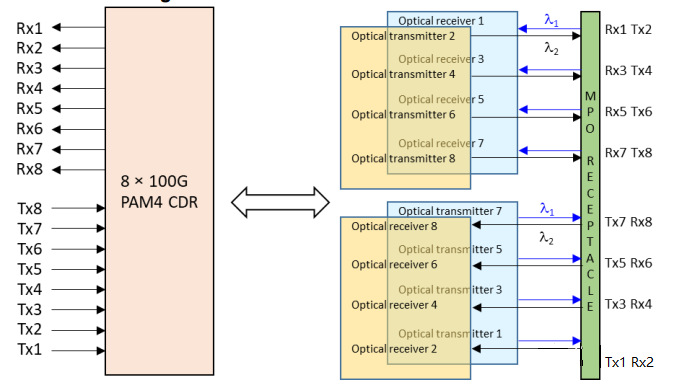
800G PAM4 CDR
Its optical interface is shown in the figure below, using MPO-12interface.

MPO-12 BiDi
For the case of single mode, there are various standards for 800G optical transceivers,
1) 800G DR8, 800G 2xDR4 and 800G PSM8
The internal architecture of these three standards is similar, including 8 Tx and 8 Rx, with a single channel rate of 100Gbps, requiring 16 fibers.
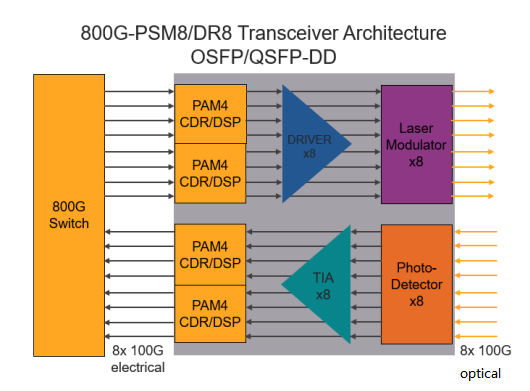
800G-PSM8/DR8 transceiver architecture OSFP/QSFP-DD
The transmission distance of PSM8 is 100m, and the transmission distance of DR8 and 2*DR4 is 500m. The optical interface of 2xDR4 is 2 MPO-12, as shown in the figure below, it can be interconnected with 400G DR4 optical modules to facilitate data center upgrades. The optical interface for PSM8 and DR8 is MPO-16.
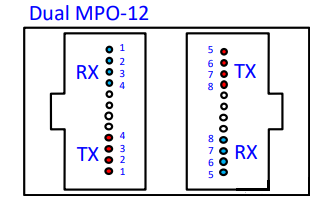
Dual MPO-12
2) 800G 2xFR4 and 2xLR4
The internal structures of these two standards are similar, including 4 wavelengths, and the single-channel rate is 100Gbps. The number of fibers is reduced through Mux, and 4 fibers are required, as shown in the figure below.
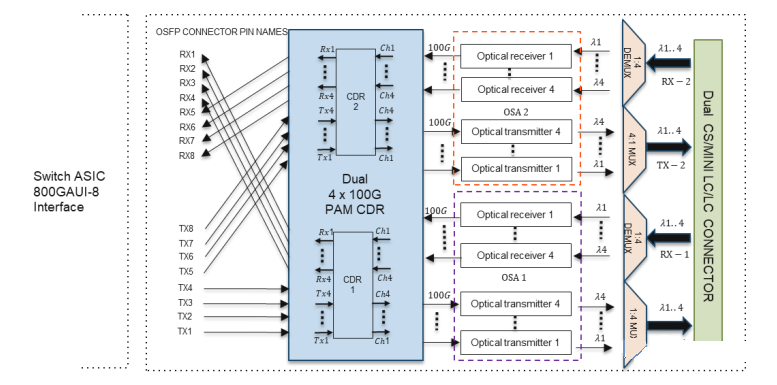
Dual 400G PAM CDR
These two solutions are upgrades to 400G FR4 and LR4 optical transceivers, using CWDM4 wavelengths of 1271/1291/1311/1331nm. 2xFR4 supports a transmission distance of 2km, and 2xLR4 supports a transmission distance of 10km. Its optical interface adopts dual CS or dual duplex LC interface.

Dual CS and Dual Duplex LC
3) 800G FR4
This scheme uses four wavelengths, and the single channel rate is 200Gbps, which requires two optical fibers to support a transmission distance of 2km, as shown in the figure below.
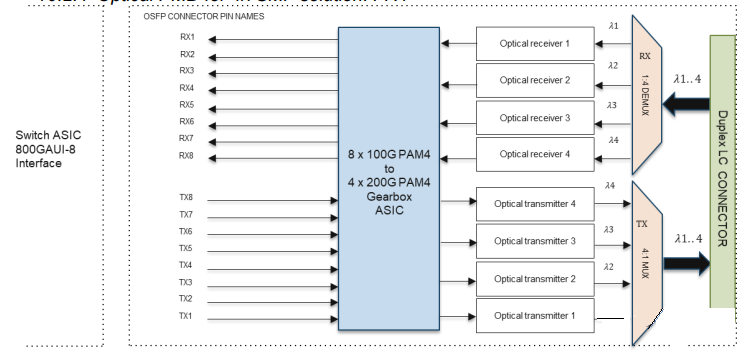
800G PAM4 to 400G PAM4 Gearbox ASIC
It uses a duplex LC optical interface, as shown in the figure below.
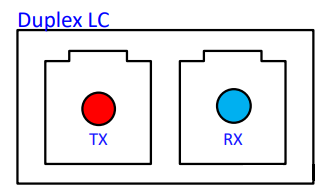
Duplex LC Optical Interface
4) 800G FR8
The solution uses 8 wavelengths, and the rate of each wavelength is 100Gbps, two optical fibers are required to support a transmission distance of 2km, as shown in the figure below. The eight wavelength channels are 1271/1291/1311/1331/1351/1371/1391/1411nm respectively.
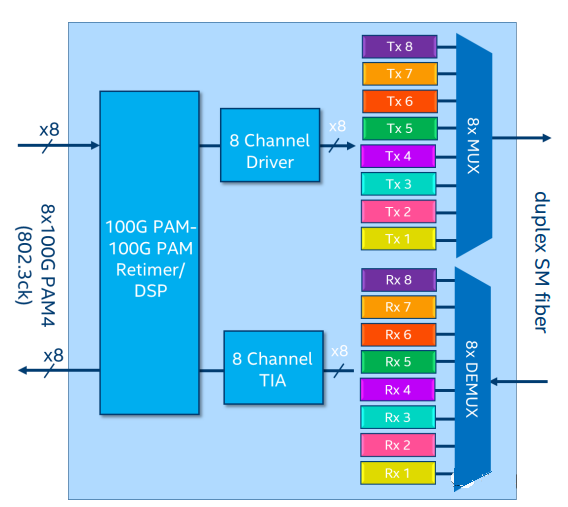
800G FR8
Both QSFP-DD and OSFP can support 800G, and the comparison between the two is shown in the figure below. For 800 optical transceivers, QSFP-DD has made some supplementary updates, namely QSFP-DD800.
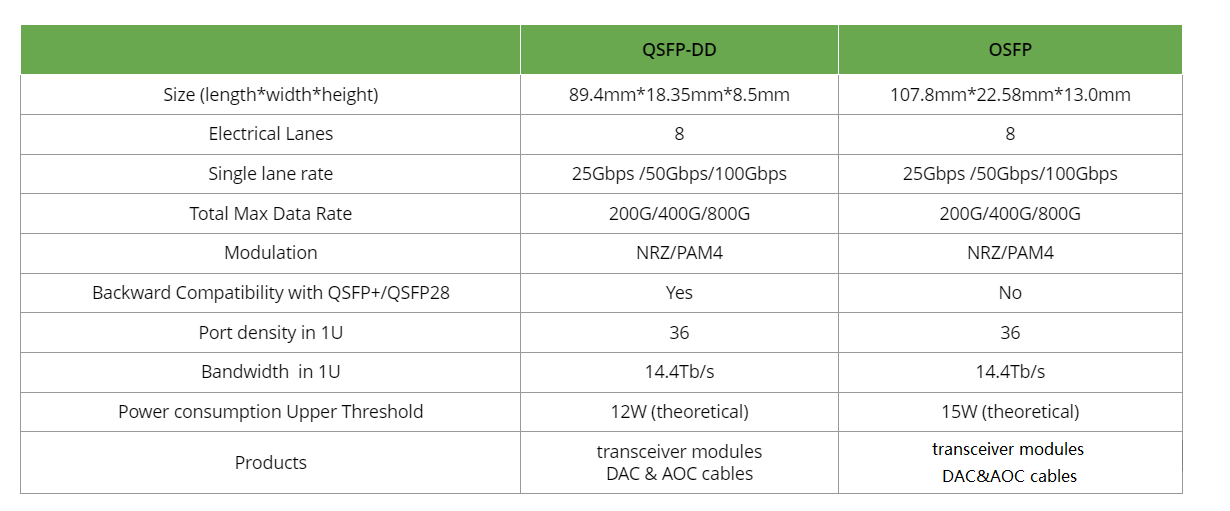
QSFP-DD and OSFP
The main differences between the two are:
1) size: OSFP is slightly larger in size
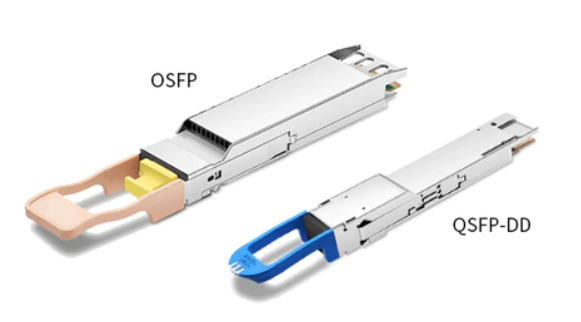
Size comparison of QSFP-DD and OSFP
2) power consumption: the power consumption of OSFP is slightly higher than that of QSFP-DD.
3) compatibility: QSFP-DD is perfectly compatible with QSFP28 and QSFP+, while OSFP is not compatible.
Currently mass-produced single mode 800G optical transceivers mainly adopt the EML solution. Can the silicon photonics solution find a place in the market? Still unknown, it mainly depends on cost and power consumption. For the single-wavelength 200G solution, EML or thin-film lithium niobate are two possible technical routes.
Related Products:
-
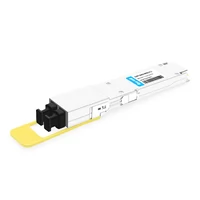 OSFP-800G-DR8D-FLT 800G-DR8 OSFP Flat Top PAM4 1310nm 500m DOM Dual MTP/MPO-12 SMF Optical Transceiver Module
$1200.00
OSFP-800G-DR8D-FLT 800G-DR8 OSFP Flat Top PAM4 1310nm 500m DOM Dual MTP/MPO-12 SMF Optical Transceiver Module
$1200.00
-
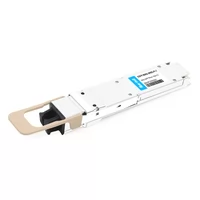 OSFP-800G-SR8D-FLT OSFP 8x100G SR8 Flat Top PAM4 850nm 100m DOM Dual MPO-12 MMF Optical Transceiver Module
$850.00
OSFP-800G-SR8D-FLT OSFP 8x100G SR8 Flat Top PAM4 850nm 100m DOM Dual MPO-12 MMF Optical Transceiver Module
$850.00
-
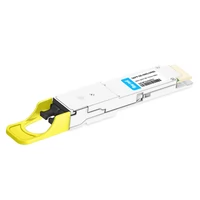 QSFP-DD-800G-DR8D QSFP-DD 8x100G DR PAM4 1310nm 500m DOM Dual MPO-12 SMF Optical Transceiver Module
$1500.00
QSFP-DD-800G-DR8D QSFP-DD 8x100G DR PAM4 1310nm 500m DOM Dual MPO-12 SMF Optical Transceiver Module
$1500.00
-
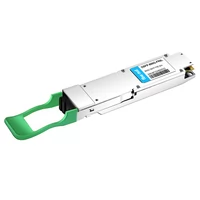 OSFP-800G-FR8L OSFP 800G FR8 PAM4 CWDM8 Duplex LC 2km SMF Optical Transceiver Module
$4500.00
OSFP-800G-FR8L OSFP 800G FR8 PAM4 CWDM8 Duplex LC 2km SMF Optical Transceiver Module
$4500.00
-
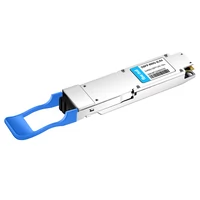 OSFP-800G-2LR4 OSFP 2x400G LR4 PAM4 CWDM4 Dual CS 10km SMF Optical Transceiver Module
$3700.00
OSFP-800G-2LR4 OSFP 2x400G LR4 PAM4 CWDM4 Dual CS 10km SMF Optical Transceiver Module
$3700.00
-
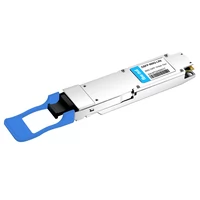 OSFP-800G-LR8 OSFP 8x100G LR PAM4 1310nm MPO-16 10km SMF Optical Transceiver Module
$2200.00
OSFP-800G-LR8 OSFP 8x100G LR PAM4 1310nm MPO-16 10km SMF Optical Transceiver Module
$2200.00
-
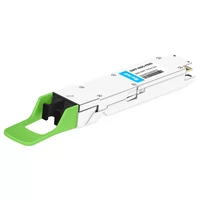 OSFP-800G-FR8D OSFP 8x100G FR PAM4 1310nm Dual MPO-12 2km SMF Optical Transceiver Module
$2000.00
OSFP-800G-FR8D OSFP 8x100G FR PAM4 1310nm Dual MPO-12 2km SMF Optical Transceiver Module
$2000.00
-
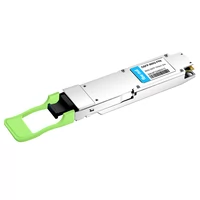 OSFP-800G-FR8 OSFP 8x100G FR PAM4 1310nm MPO-16 2km SMF Optical Transceiver Module
$1300.00
OSFP-800G-FR8 OSFP 8x100G FR PAM4 1310nm MPO-16 2km SMF Optical Transceiver Module
$1300.00
-
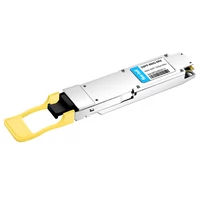 OSFP-800G-DR8 OSFP 8x100G DR PAM4 1310nm MPO-16 500m SMF DDM Optical Transceiver Module
$1100.00
OSFP-800G-DR8 OSFP 8x100G DR PAM4 1310nm MPO-16 500m SMF DDM Optical Transceiver Module
$1100.00
-
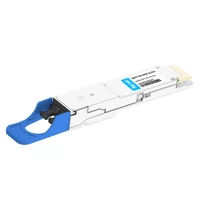 QSFP-DD-800G-2LR4L QSFP-DD 2x400G LR4 PAM4 CWDM4 10km Dual duplex LC SMF FEC Optical Transceiver Module
$4500.00
QSFP-DD-800G-2LR4L QSFP-DD 2x400G LR4 PAM4 CWDM4 10km Dual duplex LC SMF FEC Optical Transceiver Module
$4500.00
-
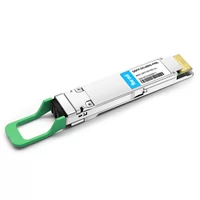 QSFP-DD-800G-FR8L QSFP-DD 800G FR8 PAM4 CWDM8 2km DOM Duplex LC SMF Optical Transceiver Module
$5000.00
QSFP-DD-800G-FR8L QSFP-DD 800G FR8 PAM4 CWDM8 2km DOM Duplex LC SMF Optical Transceiver Module
$5000.00
-
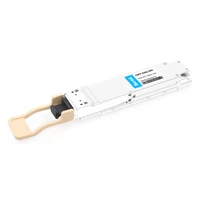 OSFP-800G-SR8 OSFP 8x100G SR8 PAM4 850nm MTP/MPO-16 100m OM4 MMF FEC Optical Transceiver Module
$750.00
OSFP-800G-SR8 OSFP 8x100G SR8 PAM4 850nm MTP/MPO-16 100m OM4 MMF FEC Optical Transceiver Module
$750.00
-
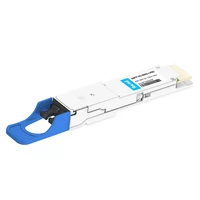 QSFP-DD-800G-LR8D QSFP-DD 8x100G LR PAM4 1310nm 10km Dual MPO-12 SMF FEC Optical Transceiver Module
$2200.00
QSFP-DD-800G-LR8D QSFP-DD 8x100G LR PAM4 1310nm 10km Dual MPO-12 SMF FEC Optical Transceiver Module
$2200.00
-
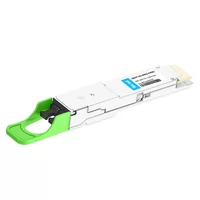 QSFP-DD-800G-FR8D QSFP-DD 8x100G FR/DR8+ PAM4 1310nm 2km DOM Dual MPO-12 SMF Optical Transceiver Module
$2000.00
QSFP-DD-800G-FR8D QSFP-DD 8x100G FR/DR8+ PAM4 1310nm 2km DOM Dual MPO-12 SMF Optical Transceiver Module
$2000.00
-
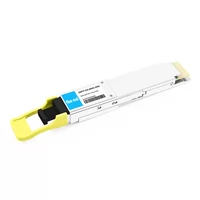 QSFP-DD-800G-DR8 800G-DR8 QSFP-DD PAM4 1310nm 500m DOM MTP/MPO-16 SMF Optical Transceiver Module
$1300.00
QSFP-DD-800G-DR8 800G-DR8 QSFP-DD PAM4 1310nm 500m DOM MTP/MPO-16 SMF Optical Transceiver Module
$1300.00
-
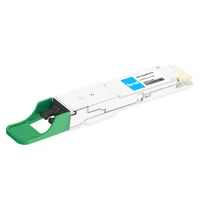 QSFP-DD-800G-2FR4 800G QSFP-DD 2FR4 PAM4 1310nm 2km DOM Dual CS SMF Optical Transceiver Module
$3500.00
QSFP-DD-800G-2FR4 800G QSFP-DD 2FR4 PAM4 1310nm 2km DOM Dual CS SMF Optical Transceiver Module
$3500.00
-
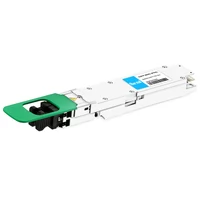 OSFP-800G-2FR4L OSFP 2x400G FR4 PAM4 1310nm 2km DOM Dual Duplex LC SMF Optical Transceiver Module
$1350.00
OSFP-800G-2FR4L OSFP 2x400G FR4 PAM4 1310nm 2km DOM Dual Duplex LC SMF Optical Transceiver Module
$1350.00
-
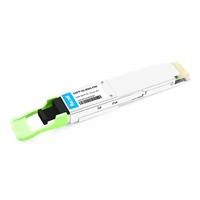 QSFP-DD-800G-FR8 QSFP-DD 8x100G FR PAM4 1310nm 2km DOM MPO-16 SMF Optical Transceiver Module
$2000.00
QSFP-DD-800G-FR8 QSFP-DD 8x100G FR PAM4 1310nm 2km DOM MPO-16 SMF Optical Transceiver Module
$2000.00
